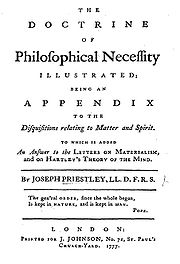
The Doctrine of Philosophical Necessity Illustrated
Encyclopedia

Metaphysics
Metaphysics is a branch of philosophy concerned with explaining the fundamental nature of being and the world, although the term is not easily defined. Traditionally, metaphysics attempts to answer two basic questions in the broadest possible terms:...
works of 18th-century British polymath
Polymath
A polymath is a person whose expertise spans a significant number of different subject areas. In less formal terms, a polymath may simply be someone who is very knowledgeable...
Joseph Priestley
Joseph Priestley
Joseph Priestley, FRS was an 18th-century English theologian, Dissenting clergyman, natural philosopher, chemist, educator, and political theorist who published over 150 works...
.
Between 1774 and 1778, while serving as an assistant to Lord Shelburne
William Petty, 2nd Earl of Shelburne
William Petty-FitzMaurice, 1st Marquess of Lansdowne, KG, PC , known as The Earl of Shelburne between 1761 and 1784, by which title he is generally known to history, was an Irish-born British Whig statesman who was the first Home Secretary in 1782 and then Prime Minister 1782–1783 during the final...
, Priestley wrote a series of five major metaphysical works, arguing for a materialist philosophy even though such a position "entailed denial of free will and the soul."
Continuing the arguments he had started in The Examination of Dr. Reid's Inquiry… Dr. Beattie's Essay… and Dr. Oswald's Appeal (1774) and Disquisitions relating to Matter and Spirit
Disquisitions relating to Matter and Spirit
Disquisitions relating to Matter and Spirit is a major work of metaphysics written by eighteenth-century British polymath Joseph Priestley and published by Joseph Johnson....
(1777), Priestley published The Doctrine of Philosophical Necessity Illustrated (1777), an "appendix" to the Disquisitions that "suggests that materialism and determinism are mutually supporting." Priestley explicitly stated that humans had no free will
Free will
"To make my own decisions whether I am successful or not due to uncontrollable forces" -Troy MorrisonA pragmatic definition of free willFree will is the ability of agents to make choices free from certain kinds of constraints. The existence of free will and its exact nature and definition have long...
: "all things, past, present, and to come, are precisely what the Author of nature really intended them to be, and has made provision for." He was the first to claim that what he called "philosophical necessity" (a position akin to absolute determinism
Determinism
Determinism is the general philosophical thesis that states that for everything that happens there are conditions such that, given them, nothing else could happen. There are many versions of this thesis. Each of them rests upon various alleged connections, and interdependencies of things and...
) is consonant with Christianity. His philosophy was based on his theological interpretation of the natural world; like the rest of nature, man's mind is subject to the laws of causation, but because a benevolent God created these laws, Priestley argued, the world and the men in it will eventually be perfected. He argued that the associations made in a person's mind were a necessary product of their lived experience because Hartley's theory of associationism was analogous to natural laws such as gravity. Priestley contends that his necessarianism can be distinguished from fatalism
Fatalism
Fatalism is a philosophical doctrine emphasizing the subjugation of all events or actions to fate.Fatalism generally refers to several of the following ideas:...
and predestination
Predestination
Predestination, in theology is the doctrine that all events have been willed by God. John Calvin interpreted biblical predestination to mean that God willed eternal damnation for some people and salvation for others...
because it relies on natural law. Isaac Kramnick points out the paradox of Priestley's positions: as a reformer, he argued that political change was essential to human happiness and urged his readers to participate, but he also claimed in works such as Philosophical Necessity that humans have no free will.
Philosophical Necessity influenced the 19th-century utilitarians John Stuart Mill
John Stuart Mill
John Stuart Mill was a British philosopher, economist and civil servant. An influential contributor to social theory, political theory, and political economy, his conception of liberty justified the freedom of the individual in opposition to unlimited state control. He was a proponent of...
and Herbert Spencer
Herbert Spencer
Herbert Spencer was an English philosopher, biologist, sociologist, and prominent classical liberal political theorist of the Victorian era....
, who were drawn to its determinism. Immanuel Kant
Immanuel Kant
Immanuel Kant was a German philosopher from Königsberg , researching, lecturing and writing on philosophy and anthropology at the end of the 18th Century Enlightenment....
, entranced by Priestley's determinism but repelled by his reliance on observed reality, created a transcendental version of determinism that he claimed allowed the mind and soul freedom.
See also
- Joseph Priestley and DissentJoseph Priestley and DissentJoseph Priestley was a British natural philosopher, political theorist, clergyman, theologian, and educator...
- List of works by Joseph Priestley
- Libertarianism (metaphysics)Libertarianism (metaphysics)Libertarianism is one of the main philosophical positions related to the problems of free will and determinism, which are part of the larger domain of metaphysics. In particular, libertarianism, which is an incompatibilist position, argues that free will is logically incompatible with a...

